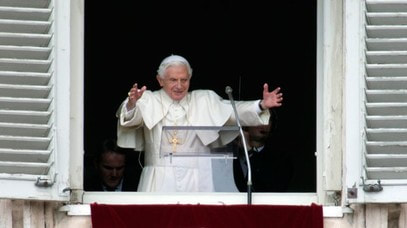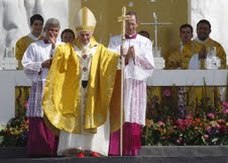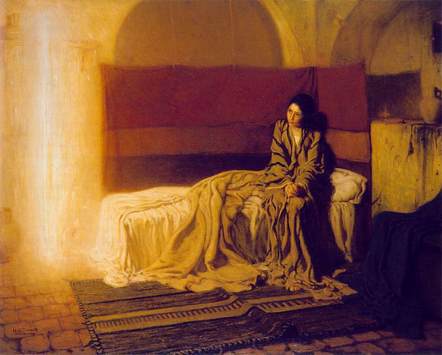|
The Catholic Apostolate Center would like to invite you to join in prayer and thanksgiving for our Holy Father, Pope Benedict the XVI, who will officially resign from his Petrine ministry this day. During his last Angelus blessing this past Sunday, Pope Benedict wrote:
During Lent, let us learn to give the right time to prayer, both personal and community prayer, which breathes air into our spiritual life. However, praying does not mean isolating oneself from the world and its contradictions, as St. Peter would have liked to have done on Mount Tabor, but prayer leads us back to the path, to action. Christian existence -- I have written in the Message for this Lent -- means to continuously climb up the mount for our encounter with God, so that afterward we can descend again filled with his love and strength to serve our brothers and sisters with the very love of God. Dear Brothers and sisters, this Word of God I feel in a particular way towards me, at this moment in my life. The Lord is calling me to "climb the mount," and to devote myself to meditation, reflection and prayer. However, this does not mean abandoning the Church, but rather, if God has requested this of me, it is so that I can continue to serve the Church with the same dedication and the same love with which I have done up until now, but in a way adapted to my age and my strength. Let us invoke Virgin Mary's intercession: Let her guide all of you to follow the Lord Jesus always, in prayer as well as in laborious charity. Let us follow in the example of Pope Benedict and root ourselves in prayer so that we might allow the spirit of humility and discernment to guide all our actions. Let us open our hearts to hear God’s promptings to use our gifts, talents, and abilities to best serve his Church. As has been emphasized before, the Catholic Apostolate Center is grateful for Pope Benedict XVI’s continual emphasis on the intrinsic connection between faith and charity, similar to St. Vincent Pallotti, founder of the Union of Catholic Apostolate and patron saint of the Catholic Apostolate Center. Pope Benedict’s humility in deciding to take this action is a great example for all of us seeking to be true servants of Jesus Christ. The Holy Father has been a gift to the Church, and the effects of his Petrine ministry will surely be felt for years to come. May Mary, Queen of Apostles, continue to guide Pope Benedict XVI, and may the Holy Spirit be with the College of Cardinals as they gather to elect his successor.
0 Comments
Each year it seems that just as soon as we’ve concluded the joyous season of Christmas, we find ourselves putting away the carols and nativity scene just to replace them with our Friday fish sandwiches and talk of our Lenten sacrifices. At first glance it may seem that the coming of Lent each year calls for us to “put away” our joy. After all it’s a season of penance to bring ourselves closer to Christ through his suffering – not exactly the definition of joy. But is it possible to still have joy during this season of prayer and reflection?
Recently I read Fr. James Martin’s book, Between Heaven and Mirth, in which he discusses how joy and our spiritual life don’t have to be mutually exclusive. Particularly he proposes ways in which we can incorporate joy into our prayer life, suggestions that we could put into practice this Lent. First and foremost we must be willing to bring our joy to the Lord through prayer. Just as we might call up a good friend with exciting news, so also should we cultivate that same desire to share our daily joys with the Lord. Although we may be in Lent, our daily lives aren’t devoid of joyous occasions. What made you laugh today? What was your “high point” of the day? When I was growing up my family would sit around the dinner table sharing our “high point,” or our favorite thing that happened to us that day. Forcing myself to remember something good was always easier some days than others but it reminded me there was always something for which I could give thanks. Additionally, beyond just recalling joyous moments, we can use our prayer to think back to the people, experiences and memories that perhaps we may take for granted. For myself, I can far too easily forget to recognize the blessings of being able to attend a university and pursue a degree, as well as the tremendous influence of my parents. Surely my years here in college and the lessons my parents instilled in me have also given rise to joy in my life; it’s just not something I always remember on a daily basis. Even more importantly, in remembering these people and experiences we may take for granted we develop a greater sense of gratitude and realize that our joy doesn’t exist in a vacuum, but because of these blessings that God has given each of us. In this we see that joy is much more than just sheer happiness. Rather, it is a reflection of our prayer life and relationship with God. As the French philosopher Leon Bloy once said, “Joy is the most infallible sign of God’s presence.” The secular world often views joy as synonymous with simple emotional happiness, yet, according to Fr. Martin, the Christian definition of joy is happiness in God and revolves around our relationship with Him. This is precisely what allows us to have joy in the midst of suffering, and yes, even Lent. Although at its outset Lent may not seem an occasion for joy, it is an occasion to deepen our prayer life and our internal joy - our happiness in God. In this prayer we can develop a greater sense of gratitude for both the blessings in our lives and, especially this Lent, an appreciation for Christ’s Paschal mystery, all of which can lead to a richer relationship with our Lord. St. Paul sums it up best in his Letter to the Thessalonians: “Rejoice always, pray without ceasing, give thanks in all circumstances; for this is the will of God for you in Jesus Christ” (1 Thessalonians 5:16-18). David Burkey is the Communications Coordinator for the Catholic Apostolate Center With the liturgical season of Lent – one of the holiest and most sacred times for our Church – now upon us, - many Catholic minds are churning in anticipation. While we prepare ourselves with the due reverence for Lent, we are equally busy devising just exactly what we shall sacrifice and how shall we keep it. While this great fast is meant to ignite a vision of our Christ, unyielding in temperance through the desert in the face of Satan’s temptations, our holy fast often is diminished to a game of “what is the best fasting practices to talk about with others?” or “I’ll kick start my diet by giving up sweets for Lent.” Suddenly our religious devotional practice becomes much less about Christ, much more about ourselves.
This is not to say our mismanaged practices are meant to only serve ourselves. It is also not meant to say that our “sacrifices” are not challenges. Nor is this meant to discourage anyone from giving up sweets. This is to say that there is a chasm in many of our modern, personal interpretations of our Catholic practice. Often, we attempt to fulfill the tradition without prayer or holy intentions and we boastfully bemoan our devotion with ironic agony to our friends and family “I won’t even have sweets on Sunday, not a bite!” This, I believe, is not what is meant for our journey through Lent with Christ. This journey is a glorious opportunity for devotion and recommitment to prayer, abstinence, and almsgiving. We may share our devotions with others, but we should seek to share as a means of support and reflection without pride or seeking attention. So, I propose a new kind of devotional practice. Instead of banishing the tasty treats from your pantry or giving up your favorite television show, let’s take one step closer to our Community of Faith in our Lenten sacrifice. These practices help us to grow closer to Christ. This year, why not try this through a prayer-filled recognition of the struggles that our brothers and sisters here on Earth face each day? Practicing sacrifice with added prayerful reflection and a commitment to our community is much more doable than one might think! This Lent, park in the back of the grocery lot; as you walk towards the door, say a prayer for older adults who may be challenged to walk such a short distance Or, if you like to give up sweets, do so in celebration for the abundance of what you have been blessed with! The money that is not spent on sweets may be used to purchase non-perishables to donate to a local Saint Vincent de Paul societies. The idea is that while we make sacrifices this Lent, we do so in the spirit of Christ and in support of our community! When we sacrifice of ourselves so that others may be blessed in the wake of our actions, we grow closer to Christ. As we sacrifice with a humble and gracious heart, prayer becomes a natural step towards not only a stronger relationship with Christ, but so too, with fellow members of our community. Brothers and sisters, let us prepare ourselves for the celebration of the Easter season by using the sacrificial Lenten season as a means to strengthen the bonds between Christ and community. Samantha Alves is working toward a M.S.W. at Boston College and currently works for the Massachusetts Coalition for the Homeless. "Shock." "Disbelief." "Uncertainty." "Bittersweet." The above descriptors were all used by friends to describe their reaction to last week’s resignation announcement by Pope Benedict XVI. I awoke at 6:02am last Monday to several text messages from friends informing me of the reported, yet still unconfirmed, “shot heard round the world.” The resignation of our Holy Father, at first, felt like the loss of a grandparent that you have grown up with; I have grown up in the Church of Pope Benedict XVI. After letting the news sink in over the last week, I have found some inspiration in Psalm 30:6, which speaks of sorrow leading to rejoicing: “Weeping may linger for the night, but joy comes with the morning.” My sense of loss has been transformed into a greater sense of admiration for a man that I have never met, yet have such a deep respect for. For lack of something more appropriate to say, I offer to you the words of the Holy Father during his homily at the Final Mass of the 26th World Youth Day in Madrid, Spain on August 21, 2011. May his words serve as a challenge to all of us during the last days of his momentous pontificate. Oremus pro Pontifice et pro invicem. Dear young friends, as the Successor of Peter, let me urge you to strengthen this faith which has been handed down to us from the time of the Apostles. Make Christ, the Son of God, the center of your life. But let me also remind you that following Jesus in faith means walking at his side in the communion of the Church. We cannot follow Jesus on our own. Anyone who would be tempted to do so “on his own”, or to approach the life of faith with that kind of individualism so prevalent today, will risk never truly encountering Jesus, or will end up following a counterfeit Jesus. Having faith means drawing support from the faith of your brothers and sisters, even as your own faith serves as a support for the faith of others. I ask you, dear friends, to love the Church which brought you to birth in the faith, which helped you to grow in the knowledge of Christ and which led you to discover the beauty of his love. Growing in friendship with Christ necessarily means recognizing the importance of joyful participation in the life of your parishes, communities and movements, as well as the celebration of Sunday Mass, frequent reception of the sacrament of Reconciliation, and the cultivation of personal prayer and meditation on God’s word. In closing, I share with you a rendition of Tu es Petrus, composed by Cardinal Domenico Bartolucci, Director Emeritus of the Sistine Chapel Choir, performed during World Youth Day in Madrid. Alex R. Boucher is the Program & Operations Coordinator for the Catholic Apostolate Center. Follow Alex on Twitter at @AlexBoucher.
My love of you, God, is not some vague feeling; It is positive and certain. Your word struck into my heart, And from that moment I loved you. Besides this, all about me, Heaven and earth and all that they contain Proclaim that I should love you. But what do I love when I love you? Not material beauty of a temporal order; Not the brilliance of earthly light; Not the sweet melody of harmony and song; Not the fragrance of flowers, perfumes, and spices; Not manna or honey; And not limbs the body delights to embrace. It is not these that I love when I love my God. And yet, when I love him, It is true that I love a light of a certain kind, A voice, a perfume, a food, an embrace; But they are the kind that I love in my inner self, When my soul is bathed in light that is not bound by space; When it listens to sound that never dies away; When it breathes fragrance that is not borne away on the wind; When it tastes food that is never consumed by the eating; When it clings to an embrace from which It is not severed by fulfillment of desire. This is what I love when I love my God. ~St. Augustine’s Canticle of Love; Confessions 10, 6-8. Happy Valentines Day from all of us at the Catholic Apostolate Center! May the LOVE of God and the LOVE of our Faith continue to grow in each of us!
Mardi Gras, to me, is another example of the type of people we Catholics are—CELEBRATORY! How many other faiths enter into a season of contemplation, penitence and conversion with a party? Tonight, in my own community we will prepare for Lent by eating red meat—an occurrence that rarely happens in our house- drinking the rest of the good wine, and finishing the King Cake that was sent to us from our family down south. Many other Catholics across the country and world will follow suit- clearing their houses of all that they will be fasting from starting tomorrow.
The celebratory people that we are today are not denied tomorrow with the season of Lent. Rather, we recognize and value that to be a people who can rejoice completely and live fully alive we must first be a people of transformation and conversion. Richard Rohr writes, “If we do not transform our pain we will transmit it.” The season of Lent is a season to contemplate the pains in our own lives and transform them, so that in the rising of the Lord at Easter we can truly REJOICE. Tomorrow we put on Ashes from the palms that we waved when we rejoiced in the coming of Christ into Jerusalem last year at Palm Sunday. These Ashes do not show our holiness, rather they outwardly show our recognition that we are a people who need to convert our ways and transform our pains. During Lent we enter into the silence of contemplation to strip ourselves of all things that keep us from pure joy and blind us from recognizing God among us. Thomas Merton, a Trappist Monk and spiritual writer, stated the following about contemplation: “To enter into the realm of contemplation, one must in a certain sense die: but this death is in fact the entrance into a higher life. It is a death for the sake of life, which leaves behind all that we can know or treasure as life, as thought, as experience as joy, as being. [Every form of intuition and experience] die to be born again on a higher level of life.” This is what we celebrate today! We celebrate being a people who wish to enter into the realm of contemplation for the sake of transformation; to enter a realm of difficulty, pain, and struggle in order transform our experiences of joy and life into pure joy and eternal life. As Catholics we enter into the season of Lent by first eating rich foods, drinking merrily, and celebrating the lives that we have been given. This joy of being Catholic is then enriched when we can fast from all that distracts us from pure joy, give alms to those in which Christ resides, and deepen our relationship with our Savior through prayer. Today we start with a party and tomorrow we live the transformation that our hearts desire so that in 40 days and 40 nights we can fully celebrate the risen Lord and rejoice as a celebratory people! Pam Tremblay is the Blog Editor for the Catholic Apostolate Center. The Catholic Apostolate Center invites you to join in prayer and thanksgiving for our Holy Father, Pope Benedict XVI, and for our Church at this time of transition. Pope Benedict XVI always emphasized the intrinsic connection between faith and charity, similar to St. Vincent Pallotti, founder of the Union of Catholic Apostolate and patron saint of the Catholic Apostolate Center. His humility in this decision is a great example of a true servant of Jesus Christ. The Holy Father has been a gift to the Church, and the effects of his Petrine ministry will be felt for years to come.
May Mary, Queen of Apostles, continue to guide Pope Benedict XVI, and may the Holy Spirit be with the College of Cardinals as they soon gather to elect his successor. Fr. Frank S. Donio, S.A.C., D.Min. Director Once, I was a college “mentor-in-faith” for the Notre Dame Vision program, leading small groups for a series of weeklong vocational conferences for high school students. During these conferences, I presented a risky talk[1]. It was risky because I knew there was a possibility of stigma and verbal abuse associated with owning some of my actions. In fact, there was a near certainty of it. However, there was also a real possibility that one or more high school students who had been struggling with sin or guilt could find some real relief, insight, or conversion. When the idea to write this talk first came to me, I found myself unable to brush it aside. Yet I struggled. I went back and forth. Eventually, however, it became apparent to me that there was nothing else to do but to offer this story. So I wrote...
My soul proclaims the greatness of the Lord; my spirit rejoices in God my savior. For he has looked upon his handmaid’s lowliness. I closed my talk with these first lines of the Magnificat, as I could understand a little of what Mary was expressing. I was amazed that my soul could proclaim any of the greatness of the Lord to others. My soul? Even in my smallness and brokenness? Yes. Even that brokenness had been turned around to glorify the Lord. Now, compare that simple story to our Mother’s. While Mary had no brokenness, she too had a smallness; an anonymity; even, arguably, a degree of worthlessness to her society. By deciding upon the motherhood of Christ, she accepted the near certainty of stigma, ostracism, even death. Yet through that decision, anonymous young Mary was able to glorify the Lord in an unprecedented way - she is the model of everything the Church can be. She is the model of conforming to God’s will. She is the model of trust in the Lord. She is the model of allowing the Lord to proclaim His greatness through her. In the Magnificat, Mary’s amazement that this could be the outcome is evident (even before she knew it would be). The greatest result was, of course, the Incarnation, and thereby human salvation. I am grateful that she thought the work of God worth the personal risk, both at her first fiat to Gabriel, and at every subsequent time her heart stood in danger of being pierced. I presented a risky talk... once. However, Mary shows us that we are called to take risks for the sake of the Gospel witness more than once in our lives, and without my deliberation born of hesitation. I ask your prayers that both you and I may be given the strength and the spirit to follow Mary’s model, to keep taking the actions that carry with them both personal risk and the corporate reward of building God’s Kingdom. Laura Berlage serves as an Echo Faith Formation Apprentice in the Diocese of Camden, NJ [1] Note: I don’t share that talk’s content here because it involves more than my own story, and the other persons involved have not authorized me to make their story the kind of public that lives online indefinitely. |
Details
Archives
July 2024
Categories
All
|
About |
Media |
© COPYRIGHT 2024 | ALL RIGHTS RESERVED








 RSS Feed
RSS Feed